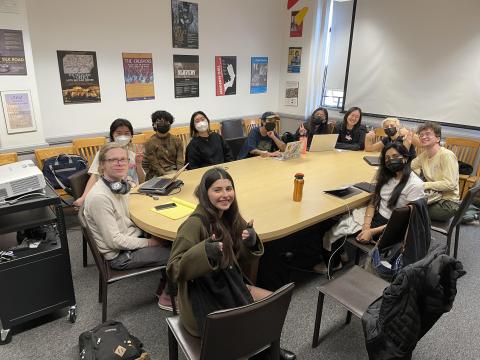Exploring the Power Dynamics of Labor: Teaching Applied Labor Research at the University of Washington
In today's complex and rapidly changing economy, it is more important than ever for workers to come together through mobilization and research to create plans for social change. That mantra is the focus of LABOR 480 Labor Studies Research: Applied Research for the Labor Movement, a labor studies research course taught by Rachel Erstad, Research Coordinator at the Harry Bridges Center for Labor Studies.
The course description emphasizes the importance of recognizing power dynamics in working relationships and the impact of policy on working people. In the course, students gain practical research skills that they can employ to support unions in their field and other labor-focused organizations. The class unpacks who has power, what power means, and who it impacts in working relationships through independent research and group projects. Rachel Erstad, who has extensive experience in labor research from her own professional work as a researcher for a labor union, explains the importance of researching power structures in the workplace.
“Power is something workers need to claim collectively. Let’s say there was going to be a major change in your workplace, and you aren’t organized. You just have to hope it works out. Only through coming together collectively and having a say in your work, typically through forming a union, can you have a say in shaping the dynamics in your workplace.”
The curriculum in LABOR 480: Applied Labor Research always connects to power and contributes to broader worker-led movements. Students complete independent research as well as at least one larger collaborative project with organizations and unions such as UFCW 3000, the Fair Work Center, and the Washington State Labor Council, AFL-CIO (WSLC). The course structure does an excellent job of balancing independent research and group collaboration: Erstad brings attention to the fact that collaborative projects in LABOR 480 “echo a workplace”, an innately collaborative environment, and that students can exercise knowledge procured from identifying research subjects. The course provides an opportunity for students to develop basic data analysis capabilities in Microsoft Excel, conduct advanced internet-based research, including utilizing datasets through public and private organizations, and learn how to submit public record requests.
"Research is unpacking power and how it’s held. Most of us will be workers and are workers at different parts of our lives.”
Erstad motivates her students to challenge power in inequitable workplaces and affirms the course’s mission of developing a deeper understanding of the adversities facing workers today and how they can be addressed. Covering issues of intersectionality, including race and gender, this course inspires students to consider and evaluate how these intersecting identities impact working relationships and power dynamics. Erstad referenced how her students discussed an article about the exclusion of agricultural and domestic workers in the National Labor Relations Act during class, and how there are ongoing efforts to deconstruct prejudiced and discriminatory sections of the act.
“We cannot talk about power without talking about systemic racism or gender inequities. Without talking about systemic racism, we’re completely missing the point of unpacking power in the labor movement.”
One of the unique aspects of this course is the emphasis on collaboration with unions and other labor-focused organizations. By working on projects with these organizations, students enhance their understanding of the tangible struggles facing working people and will be able to apply their research techniques in a real-world context.
Erstad provided an example of a group of students in a previous iteration of the course reaching out and interviewing constituency groups of color with MLK Labor and the Washington State Labor Council, the coalition of Black trade unionists, APALA, and union leaders of color in the Seattle metro area. In addition, Erstad highlighted how another group of students did a write-up and interviewed mentors and mentees participating in the Imagine Institute’s Imagine University. Overall, LABOR 480 offers an exciting opportunity for students to accumulate their research aptitude and contribute to broader worker-led movements.
“It’s a system of things we find ourselves up against. The system of capitalism is perpetuated by racism and feeds off other inequities. I want people to leave that classroom feeling like they can challenge power and that they can do the investigative work needed.”
